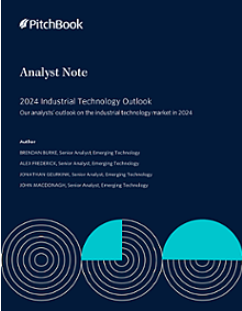
What does 2024 hold for industrial tech? PitchBook’s latest Emerging Technology Research looks ahead to what could be in store for verticals like agtech, clean energy, and more.
Here is a summary of Pitchbook’s Outlook on Agtech, the Internet of Things, Supply Chain Tech, Carbon & Emissions Tech, and Clean Energy.
AGTECH: Autonomous farm robots will see a major increase in adoption.
The anticipated surge in adoption of autonomous farm robotics in 2024 is driven by a convergence of compelling factors addressing critical challenges within the agriculture sector.
First, the persistent global labor shortages in agriculture are pushing farmers to seek alternative solutions, with farm automation offering a viable response to mitigate the impact of diminishing workforce availability.
Second, technological advancements, particularly in artificial intelligence, sensors, and automation, have matured to a point where the cost-effectiveness and reliability of robotic systems make them increasingly attractive for widespread adoption.
Third, the imperative to optimize resource use, reduce operational costs, and enhance overall farm efficiency aligns seamlessly with the capabilities of modern farm robotics, positioning them as essential tools for a more sustainable and productive agricultural future.
Fourth, the rise of Robotics-as-a-Service models is proving instrumental in easing upfront costs associated with adopting these technologies.
Fifth, pilot studies have successfully demonstrated the effectiveness of farm robotics, and companies are now transitioning to full-scale commercialization, making 2024 a pivotal year for the integration of these technologies into mainstream agricultural operations.
INTERNET OF THINGS: Outlook: Private 5G startups will produce a unicorn valuation in a late-stage deal or acquisition.
Unicorn valuations have been rare in the Internet of Things (IoT) industry with only two VC deals for Dragos and EquipmentShare valuing companies over $1.0 billion in North America and Europe in 2023. 5G startups have not reached this threshold despite achieving rapid valuation growth for midstage companies and a $1 billion exit in the space in 2020 for Cradlepoint. Numerous technical and commercial barriers to entry will ease over the coming year and revenue growth is on pace to accelerate.
The fundraising timelines of private leaders align with this trend, creating investment opportunities for growth-stage and corporate VC investors, along with telecommunications acquirers.
SUPPLY CHAIN TECH: Drone deliveries will go commercial in the US with more funding and investor interest in the space.
The Federal Aviation Administration (FAA) regulates the drone delivery market with a primary consideration on safety. To date, drones have been subject to a restriction called beyond visual line of sight (BVLOS) meaning an operator must have the drone within sight at all times when it is flying.
This restriction represents a significant (some might say insurmountable) hurdle for the development of a drone delivery marketplace. The cost of an operator visually tracking and monitoring every delivery via drone is prohibitive.
The FAA has stated that it wants to integrate drones into common airspace, and issued a number of exemptions to the BVLOS rule to startups and larger companies over the course of 2023.
These exemptions open the door for the market to finally develop.
CARBON & EMISSIONS TECH: Demand for carbon credits will recover, following uncertainty in 2022 and 2023.
Voluntary carbon markets (VCMs) have been under significant scrutiny in recent years, particularly carbon credits based on avoidance—rather than removal—of emissions.
Multiple different sets of standards, and the perceived risk associated with low-integrity credits, has been reducing the overall traded volumes of carbon credits, and has been pushing buyers toward removal-based credits that are easier to prove the integrity of.
New independent standards are emerging, and while there are no obligations for credit providers to follow them, they provide the means to show high integrity and reassure buyers.
CLEAN ENERGY: US clean hydrogen technology companies will become acquisition targets.
Low-carbon hydrogen is seen as a key component of global decarbonization efforts, particularly for certain industrial applications and heavy transportation. Earlier this year, the US Department of Energy allocated $7 billion to a program to develop seven hydrogen hubs across the US, to produce, store, and distribute hydrogen.
Companies involved in these hubs are varied, including energy and oil & gas companies that have experience with large-scale energy projects, but will likely look to close technology gaps through acquisitions.
To read PitchBook’s full report, click here.
PitchBook is a Morningstar company providing the most comprehensive, most accurate, and hard-to find data for professionals doing business in the private markets.
